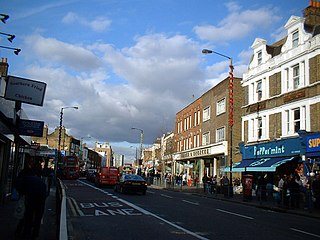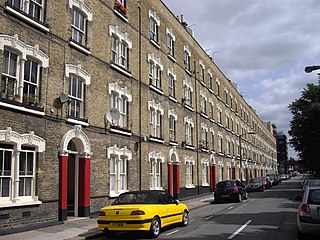
Walworth is a district of south London, England, within the London Borough of Southwark. It adjoins Camberwell to the south and Elephant and Castle to the north, and is 1.9 miles (3.1 km) south-east of Charing Cross.

Elephant and Castle is an area of South London, England, in the London Borough of Southwark. The name also informally refers to much of Walworth and Newington, due to the proximity of the London Underground station of the same name. The name is derived from a local coaching inn.

The Rote Flora is a former theatre in the Sternschanze district of Hamburg, Germany. It has been squatted since November 1989 as a self-managed social centre. The collective said in 2001 "We are the 'UFO in the neighbourhood.' The black hole in public space. The City won't get rid of us because we are a part of what life is."

Infoshops are places in which people can access anarchist or autonomist ideas. They are often stand-alone projects, or can form part of a larger radical bookshop, archive, self-managed social centre or community centre. Typically, infoshops offer flyers, posters, zines, pamphlets and books for sale or donation. Other items such as badges, locally produced artworks and T-shirts are also often available. Infoshops can also provide printing and copying facilities for people to produce their own literature or have a meeting space.

Self-managed social centres in the United Kingdom can be found in squatted, rented, mortgaged and fully owned buildings. These self-managed social centres differ from community centres in that they are self-organised under anti-authoritarian principles and volunteer-run, without any assistance from the state. The largest number have occurred in London from the 1980s onwards, although projects exist in most cities across the UK, linked in a network. Squatted social centres tend to be quickly evicted and therefore some projects deliberately choose a short-term existence, such as A-Spire in Leeds or the Okasional Café in Manchester. Longer term social centres include the 1 in 12 Club in Bradford, the Cowley Club in Brighton and the Sumac Centre in Nottingham, which are co-operatively owned.

The Pullens Buildings, also known as the Pullens Estate, are some of the last Victorian tenement buildings surviving in London, England. In the Walworth, Newington area, they are near Elephant and Castle and Kennington Underground stations. Located in Amelia Street, Crampton Street, Iliffe Street, Penton Place and Peacock Street, they are protected by Conservation Area status granted by Southwark Council.

Self-managed social centres in Italy exist in many cities. They are part of different left-wing political networks including anarchist, communist, socialist, and autonomist. The centres tend to be squatted and provide self-organised, self-financing spaces for alternative and noncommercial activities such as concerts, exhibitions, farmers' markets, infoshops, and migrant initiatives. Over time, some but not all projects have opted to legalize their status.
The Spike Surplus Scheme was a community-run self-managed social centre in a squatted building in Peckham, South London. It was occupied in 1999 and provided a range of mostly free activities for local people until its eviction in 2009 by Southwark Council.

The Heygate Estate was a large housing estate in Walworth, Southwark, South London comprising 1,214 homes. The estate was demolished between 2011 and 2014 as part of the urban regeneration of the Elephant & Castle area. Home to more than 3,000 people, it was situated adjacent to Walworth Road and New Kent Road, and immediately east of the Elephant & Castle road intersection. The estate was used extensively as a filming location, due in part to its brutalist architecture.

Squat Milada is a First Republic villa located in the Libeň district of Prague. Milada was intended to be demolished in the 1980s and deleted from the cadastre. Therefore it was a house which officially did not exist and it became one of the Czech Republic's best known squats, occupied from 1997 until 2009. It was then reoccupied for a day in 2012. Acting as a self-managed social centre and infoshop hosting concerts and events, Milada was also home to a number of people. Despite various plans for the site, as of 2021, the building was standing derelict.
Self-managed social centers, also known as autonomous social centers, are self-organized community centers in which anti-authoritarians put on voluntary activities. These autonomous spaces, often in multi-purpose venues affiliated with anarchism, can include bicycle workshops, infoshops, libraries, free schools, meeting spaces, free stores and concert venues. They often become political actors in their own right.

121 Centre was a squatted self-managed social centre on Railton Road in Brixton, south London from 1981 until 1999. As an anarchist social centre, the venue hosted a bookshop, cafe, infoshop, library, meeting space, office space, printing facility, and rehearsal space. Organisations using the space included Food Not Bombs, Anarchist Black Cross prisoner aid chapters, an anarcho-feminist magazine, a squatters aid organisation, and an anarchist queer group. Regular events at 121 Centre included punk concerts, a women's cafe night, and a monthly queer night. The centre kept a low profile and was one of the longest-lasting squats in London.

Klinika was a squatted self-managed social centre in Žižkov, Prague, from 2014 until 2019. It followed in the tradition of anarchist projects such as Ladronka and Milada.

CSOA Forte Prenestino is a large self-managed social centre based in a squatted fort in Centocelle, Rome. It was occupied on May Day 1986. Forte Prenestino is an "important node of production of cultural and political events" and hosts many groups and events across its 13 hectares.

Squatting became a political phenomenon in the Czech Republic after the Velvet Revolution in 1989. Squats in Prague included Sochora, Stary Střešovice and Ladronka. Milada was occupied in 1998 and following its final eviction in 2009, there was a lull in squatting actions. In the 2010s a new social movement squatted houses to highlight the number of derelict properties in Prague and the social centre Klinika was founded in 2014.

Squatting in Spain refers to the occupation of unused or derelict buildings or land without the permission of the owner. In Francoist Spain migrant workers lived in slums on the periphery of cities. During the Spanish transition to democracy, residential squatting occurred in Spanish cities such as Barcelona, Bilbao, Madrid, Valencia and Zaragoza. From the 1980s onwards a new generation of squatters set up self-managed social centres which hosted events and campaigns. The 1995 Criminal Code among other things criminalised squatting, but failed to stop it. Social centres exist across the country and in Barcelona and Madrid in particular. In the Basque Country they are known as gaztetxes.
Okupa Che is an anarchist self-managed social centre in Mexico City, Mexico. An auditorium and associated rooms were squatted during the 1999–2000 UNAM strike on 4 September 2000 at the National Autonomous University of Mexico (UNAM).

Squatting in Croatia has existed as a phenomenon since the decline of the Roman Empire. In the 1960s much private housing in major cities was illegally constructed or expanded and since the 1990s squatting is used as a tactic by feminists, punks and anarchists. Well-known self-managed social centres such as the cultural centre Karlo Rojc in Pula, Nigdjezemska in Zadar and (AKC) Medika in Zagreb.
The modern political squatting movement began in Hamburg, Germany, when Neue Große Bergstraße 226 was occupied in 1970. Squatters wanted to provide housing for themselves amongst other demands such as preventing buildings from being demolished and finding space for cultural activities. The Hafenstraße buildings were first occupied in 1981 and were finally legalized after a long political struggle in 1995. The still extant Rote Flora self-managed social centre was occupied in 1989. Squatting actions continue into the present; more recent attempts are quickly evicted, although the Gängeviertel buildings were squatted and legalized in the 2010s.

















